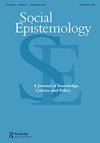专家声誉的社会指标
IF 2
2区 哲学
Q1 HISTORY & PHILOSOPHY OF SCIENCE
引用次数: 1
摘要
信任是一个来自社会科学工具箱的概念,在过去的15年里,它已经成为一个主流的认识论概念。认识信任的概念与道德和社会信任的概念不同,前者涉及对他人的各种合理推理。如果我相信一位科学家对新冠肺炎疫苗的有效性,我必须有认识上的理由。因此,我有理由相信她,因为我有一个认识论的理由来证明我的信仰是正确的。我将通过指出几个社会指标来挑战认识信任与道德和社会信任之间的区别,这些指标以合理的方式有助于我们的信任态度。声誉、价值观和对价值观的道德承诺的社会指标是以理性的方式获得信任的不可或缺的策略,这种态度不同于仅仅相信真相。我还指出了信任专家声誉的脆弱性,并强调了在信任他人声誉时避免偏见的重要性,以使我们对专家的尊重更加坚定。本文章由计算机程序翻译,如有差异,请以英文原文为准。
The Social Indicators of the Reputation of an Expert
ABSTRACT A notion that comes from the toolbox of social sciences, trust has become a mainstream epistemological concept in the last 15 years. The notion of epistemic trust has been distinguished from the notion of moral and social trust, the former involves kinds of inferences about the others that are rationally justifiable. If I trust a scientist about the efficacy of a vaccine against COVID-19, I must have an epistemic justification. I am therefore rationally justified in trusting her because I have an epistemic reason to justify my belief. I will challenge the distinction between epistemic and moral and social trust by pointing to several social indicators that contribute to our trustful attitudes in a reasonable way. Social indicators of reputation, values and moral commitments to values are indispensable strategies to come to trust in a rational way, an attitude that is different from merely believing the truth. I also point out the fragility of trusting experts’ reputations and stress the importance of avoiding biases in trusting other people’s reputations to make our deference to experts more robust.
求助全文
通过发布文献求助,成功后即可免费获取论文全文。
去求助
来源期刊

Social Epistemology
Multiple-
CiteScore
2.60
自引率
17.60%
发文量
60
期刊介绍:
Social Epistemology provides a forum for philosophical and social scientific enquiry that incorporates the work of scholars from a variety of disciplines who share a concern with the production, assessment and validation of knowledge. The journal covers both empirical research into the origination and transmission of knowledge and normative considerations which arise as such research is implemented, serving as a guide for directing contemporary knowledge enterprises. Social Epistemology publishes "exchanges" which are the collective product of several contributors and take the form of critical syntheses, open peer commentaries interviews, applications, provocations, reviews and responses
 求助内容:
求助内容: 应助结果提醒方式:
应助结果提醒方式:


